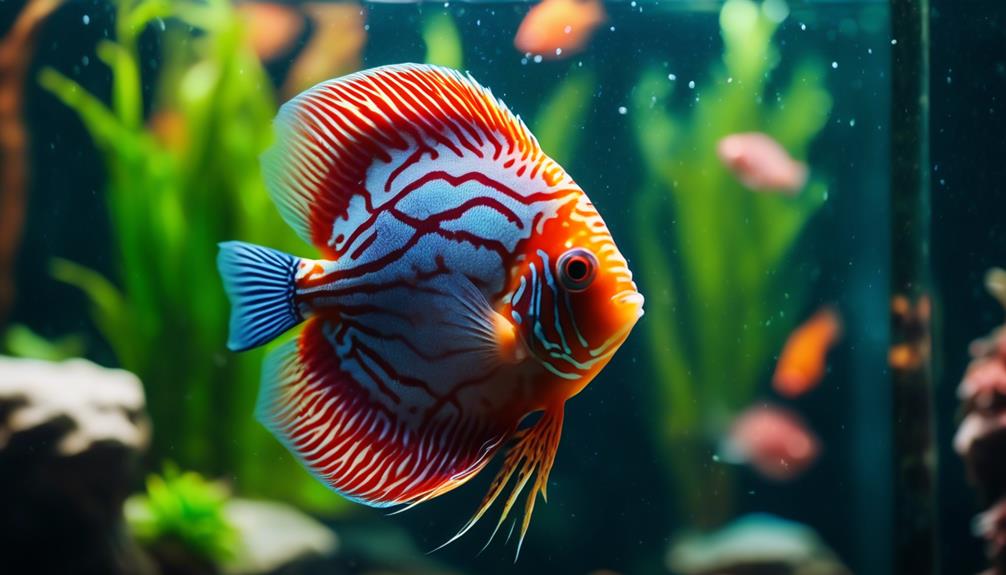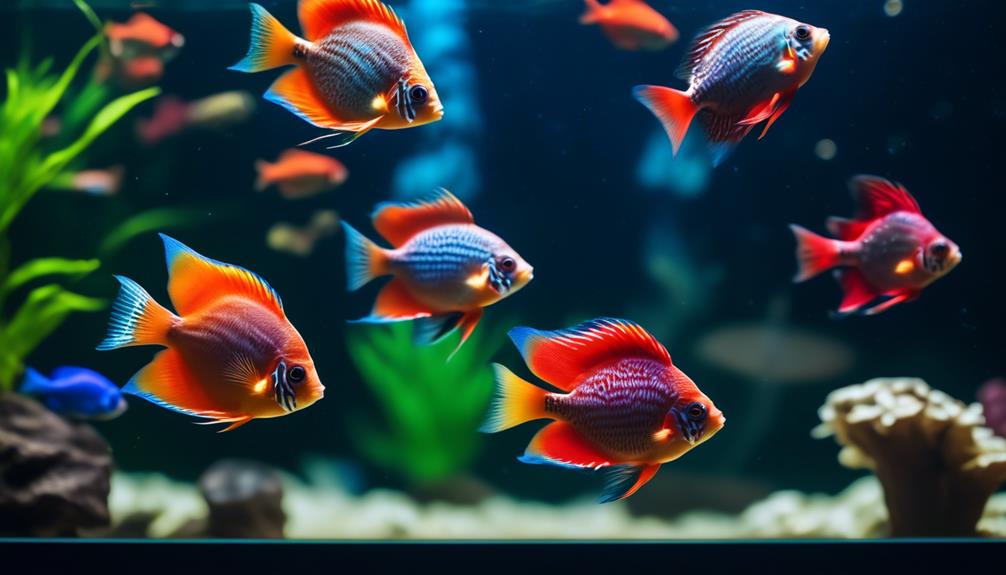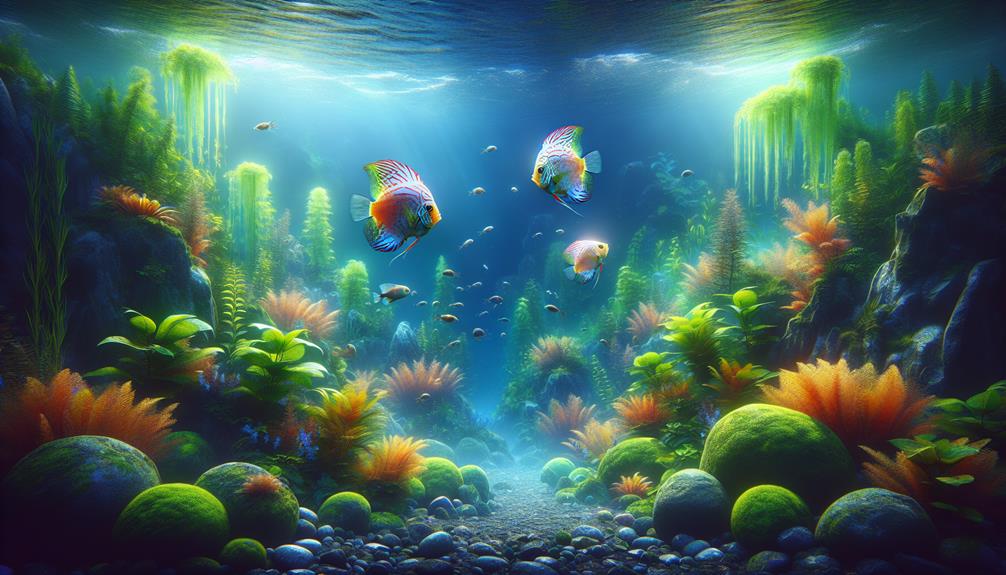Discus fish, with their vibrant colors and unique shape, have become a sought-after species among aquarium enthusiasts.
However, ensuring their well-being and maintaining their health requires specific knowledge and attention to detail.
From tank setup and ideal conditions to feeding and nutrition, health and disease prevention, breeding techniques, and compatible tank mates, this article will provide invaluable insights into perfectly caring for discus fish in your aquarium.
Whether you are a beginner or an experienced aquarium keeper, this guide will equip you with the necessary information to create a thriving and visually stunning environment for your discus fish.
So, if you're ready to unlock the secrets and master the art of discus fish care, keep reading to discover the key to aquarium success.
Key Takeaways
- Discus fish require specific water conditions, including a temperature range of 82-86°F and a pH level between 6.0-7.0.
- A minimum tank size of 55 gallons is recommended for a group of discus fish to provide ample space.
- Providing a varied diet of high-quality pellets, flakes, and frozen foods, supplemented with live or frozen bloodworms and brine shrimp, is essential for their nutrition.
- Regular monitoring of water parameters, performing water changes, and quarantining new fish are important for maintaining the health and disease prevention of discus fish.
Tank Setup and Ideal Conditions
Creating the ideal tank setup and maintaining optimal conditions is crucial for the health and well-being of discus fish in your aquarium. Discus fish have specific water parameter requirements that must be met to ensure their overall health.
The water temperature should be maintained between 82-86°F, and a minimum tank size of 55 gallons is recommended for a group of discus fish. Proper filtration is of utmost importance to maintain water quality and remove waste. Using a sponge filter or a canister filter will help in achieving this.
Additionally, providing hiding spots and plants in the tank will mimic their natural habitat and make them feel secure. Soft substrates like sand should be used to prevent injuries to their delicate fins.
Feeding and Nutrition
What is the recommended diet for discus fish to ensure their proper growth and nutrition? Discus fish require a varied diet to meet their nutritional needs and promote optimal growth. A balanced diet for discus fish consists of high-quality pellets, flakes, and frozen foods. Additionally, supplementing their diet with live or frozen bloodworms and brine shrimp provides essential nutrients. It is important to feed discus fish 2-3 times a day in small portions to prevent overeating and digestive issues. Monitoring their appetite and adjusting the feeding schedule accordingly ensures they receive adequate nutrition without compromising water quality. Overfeeding should be avoided to prevent health problems and water pollution. Maintaining a proper feeding schedule and providing a diverse diet will contribute to the overall health and well-being of discus fish.
| Recommended Foods | Feeding Schedule |
|---|---|
| High-quality pellets, flakes, and frozen foods | 2-3 times a day |
| Live or frozen bloodworms and brine shrimp | Supplement diet |
Health and Disease Prevention

To ensure the well-being of your discus fish, it is crucial to prioritize their health and take preventative measures against diseases. Regular water testing is of utmost importance as it allows you to monitor the water quality and identify any potential issues before they become serious. It helps maintain the optimal conditions for your discus fish, preventing stress and disease.
Here are some important steps to follow:
- Regularly test water parameters to ensure proper conditions and maintain the health of your discus fish.
- Perform regular water changes to maintain water quality and remove any toxins or pollutants.
- Quarantine new fish before introducing them to the main tank to prevent the spread of diseases.
- Learn to identify common diseases in discus fish such as fin rot or ich, and treat them promptly with appropriate medications.
Breeding Discus Fish
Breeding discus fish requires meticulous attention to water parameters, tank conditions, and specific breeding techniques. To successfully breed discus fish, it is essential to provide a separate breeding tank with soft, acidic water. Increasing the temperature and performing frequent water changes can stimulate breeding behavior. Discus fish are attentive parents and will care for their eggs and fry. It takes around 48-72 hours for the eggs to hatch. Once the fry have hatched, they should be separated from the parents and fed with powdered or liquid food. To create a visual image of the breeding process, refer to the table below for a summary of breeding techniques and spawning behavior.
| Breeding Techniques | Spawning Behavior |
|---|---|
| Provide separate tank | Parents care for eggs |
| Soft, acidic water | Eggs hatch in 48-72 hours |
| Increase temperature | Separate fry from parents |
| Frequent water changes | Feed powdered or liquid food |
Tank Mates for Discus Fish

Continuing our exploration of caring for discus fish, let's now turn our attention to the important consideration of selecting suitable tank mates for these majestic creatures.
Choosing suitable tank mates is crucial to ensure the well-being and compatibility of the discus fish with other fish species. Here are some factors to keep in mind when selecting tank mates for discus fish:
- Compatibility with other fish species: It is essential to choose fish species that can tolerate the high temperatures required for discus fish and do not outcompete them for food.
- Avoid fast-moving fish: Discus fish are slow feeders, so it is best to avoid fast-moving fish like barbs or tetras that may snatch away their food.
- Cardinal tetras: These peaceful and colorful fish make excellent tank mates for discus fish. They thrive in the same water conditions and add beauty to the aquarium.
- Sterbai cory catfish: Known for their peaceful nature, these catfish are compatible with discus fish. They help keep the tank clean by scavenging for food.
- Bristlenose plecos: These algae-eating fish are a great addition to the tank. They coexist peacefully with discus fish and aid in maintaining a clean environment.
Frequently Asked Questions
How Long Do Discus Fish Typically Live in Captivity?
Discus fish typically live for 8-10 years in captivity when provided with proper care. To ensure their longevity, maintain ideal water conditions, offer a balanced diet, monitor their health, and provide suitable tank mates.
Can Discus Fish Be Kept in a Community Tank With Other Species?
Discus fish can be kept in a community tank with compatible species. It is important to choose tankmates that tolerate high temperatures and do not outcompete discus fish for food, such as cardinal tetras, Sterbai cory catfish, and bristlenose plecos.
Are Discus Fish Prone to Any Specific Diseases or Health Issues?
Discus fish are prone to several diseases and health issues, including fin rot, ich, and bacterial infections. Maintaining proper water conditions, regular testing, and prompt treatment with appropriate medications are essential for their well-being.
How Often Should the Water in a Discus Fish Tank Be Tested for Parameters?
Testing the water parameters in a discus fish tank is crucial for maintaining their optimal health. It is recommended to test the water weekly or bi-weekly to ensure proper conditions and make necessary adjustments if needed.
What Are Some Common Signs of Stress in Discus Fish and How Can They Be Addressed?
Common signs of stress in discus fish include loss of appetite, color fading, hiding, and erratic swimming. Address stress by ensuring optimal water conditions, providing a peaceful environment, and offering a varied diet. Regular monitoring and prompt action are essential for the well-being of discus fish.
Conclusion
In conclusion, this comprehensive guide has provided valuable insights into creating an optimal environment for discus fish in your aquarium.
By following the recommendations for tank setup, ideal water conditions, feeding and nutrition, health and disease prevention, breeding techniques, and compatible tank mates, you can ensure the well-being and vibrant colors of your discus fish.
With the knowledge and attention to detail outlined in this guide, you can create a thriving and visually stunning environment for your discus fish.

